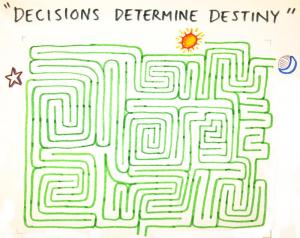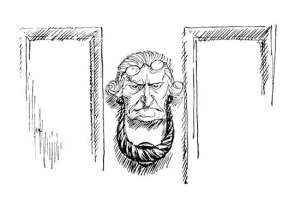Today I came across a great resource for implementing the 20 Critical Controls for network security at a small business or company.
Tuesday, September 6, 2011
Sunday, September 4, 2011
Saturday, June 18, 2011
Blessings of Motherhood
This year, my church gave me the opportunity to speak to the congregation on Mother's Day. As I prepared my remarks, I wanted to find some quotes that would appeal not just to mothers but to women who didn't have any children of their own. I found some choice ones I'd like to share here:
The spiritual rewards of motherhood are available to all women. Nurturing the young, comforting the frightened, protecting the vulnerable, teaching and giving encouragement need not—and should not—be limited to our own children (Elder Russell M. Nelson, “Lessons from Eve,” Ensign, Nov 1987, 86).
Female roles did not begin on earth, and they do not end here. A woman who treasures motherhood on earth will treasure motherhood in the world to come, and “where [her] treasure is, there will [her] heart be also” (Matt. 6:21). By developing a mother heart, each girl and woman prepares for her divine, eternal mission of motherhood. “Whatever principle of intelligence [she] attain[s] unto in this life, it will rise with [her] in the resurrection. And if a person gains more knowledge and intelligence in this life through [her] diligence and obedience than another, [she] will have so much the advantage in the world to come” (D&C 130:18–19).
In my experience I have seen that some of the truest mother hearts beat in the breasts of women who will not rear their own children in this life, but they know that “all things must come to pass in their time” and that they “are laying the foundation of a great work” (D&C 64:32–33). As they keep their covenants, they are investing in a grand, prestigious future because they know that “they who keep their second estate shall have glory added upon their heads for ever and ever” (Abr. 3:26) (Julie B. Beck, “A ‘Mother Heart’,”Ensign, May 2004, 75).
Sunday, May 22, 2011
Monday, May 16, 2011
Hawking Says Heaven a 'Fairy Story'
Whenever there is a discussion about whether or not there is a God, I just love to contribute my two cents. I like the medium of the internet, blogs, etc., because it allows me to think through my response before posting it.
Today, I couldn't help but respond to a report about the great British scientist Stephen Hawking saying that "I regard the brain as a computer which will stop working when its components fail. There is no heaven of afterlife for broken down computers; that is a fairy story for people who are afraid of the dark."
I respect Dr. Hawking a lot for his courage in facing A.L.S. (Lou Gehrig's disease) for almost 50 years now. I appreciate his willingness to explain the theory of relativity and other challenging concepts in his book, A Brief History of Time.
Here is my response:
If there is no God, what is the point of being good? Why not just get away with everything that we can? If there is no God, what is this feeling I get in my heart when I help a stranger, or hold my 3 week-old son?
Isaiah 45:15 says, "Truly you are a God who hides himself, O God and Savior of Israel." If God appeared to everyone, and manifested His power to all, there would be no one who didn't believe in Him. God deliberately hides Himself behind a veil, waiting to reveal Himself to those that seek him "as a child," humbly and sincerely. It has always been so. This is God's plan, that we choose for ourselves.But our freedom to choose does not give us the power to alter reality. Either there is a God, or religion is the biggest farce ever concocted. Remember the story of the rich man and Lazarus in Luke 16:19-31? After the rich man died, he looked up in torment at the beggar Lazarus in heaven, and begged God to send a miracle to his relatives still living, so that they might believe and repent, and avoid the suffering he was in. But God said, "They have Moses and the Prophets; let them listen to them. If they do not listen to Moses and the Prophets, they will not be convinced even if someone rises from the dead."Point is, to those who seek Him, God will reveal Himself by the "still, small voice" (King James language. The NIV calls it a "gentle whisper." See 1 Kings 19:11-13). To do otherwise would remove the requirement of faith, the key component for our growth and development as His children.
Thursday, April 21, 2011
Soul Surfer
I had the pleasure of watching the new movie Soul Surfer this evening, and I'd like to share some thoughts and reactions here.
Growing up, I loved dinosaurs, legos, and Star Wars toys. I loved Transformers, video games, and Japanese animation. Then when I was 18 years old, I had a decision to make about whether or not I was going to leave my university studies, my home, my CDs, and my video games to serve a two-year mission for the Church of Jesus Christ of Latter-day Saints. Becoming a missionary for the Church is entirely a volunteer activity; there is no monetary compensation. Young men are encouraged to earn and save money to be able to pay the costs associated with living and teaching the gospel for the term of their mission, which currently runs over $10,000 USD. As a youth, I had no such foresight or even desire to serve a mission. I spent my money on myself.
So it would seem like a no-brainer. Why would I want to leave everything and go off somewhere (the Church leaders assign where you go; you don't get to pick), and knock on doors trying to convert people to Christianity? And yet, it was something that weighed on my 18 year-old mind and heart.
I had several peers that went on missions before I did (they turned 19, the minimum mission age for men, before me), and their letters (from one friend in particular) were encouraging, even if they were a bit strange. In 1 Corinthinas 13:12, Paul speaks of seeing through a "glass darkly." This is a good description of the barrier that exists between someone involved in religion or faith-based living and someone who is not. I'm not talking about a physical barrier, and it really goes beyond being even a mental or emotional barrier. It's almost like a weird twist on the Tower of Babel story, but where two people are actually speaking the same language, but their views of "reality" (paradigms) are so different that they can't understand each other. Or in the words of Pink Floyd, "your lips move, but I can't hear what you're saying."
One of my Japanese instructors was a member of the Church, and after asking about my plans to serve a mission and hearing my indeterminate response, he respectfully but strongly encouraged me to go, saying that my talents and abilities were needed in the missionfield.
At the time I lived close to my grandparents, and visited them regularly. I asked them what they thought of going on a mission. Both of my grandmothers responded that they thought it was a good thing. One grandma had two sons that served missions (my father and my uncle) and she said that the experience really helped them a lot. I think these remarks helped my mind and heart to be prepared for when I asked my Mom what she thought about serving a mission.
We were in the car, driving home from somewhere and were only a few minutes from our house. She said that over the years she had seen many young men in our Church leave on their missions, and when they got back after two years, they were more mature, grown up, and likely to take a responsible place in society. These were definitely not the words she used, but this is what I understood; and there are no words for the peace that "switched on" in my heart: that a mission was exactly what I needed. At that point in my life, I was feeling "stuck in neutral," like Justin in this article. I knew what kind of man I wanted to be and was expected to be, but had no idea how to get there. I felt like a mission would help me "grow up" and out of the self-absorbed teenager that I was.
This feeling turned out to be true. On my mission I found out first-hand the truth of the verse that says "For whosoever will save his life shall lose it: and whosoever will lose his life for my sake shall find it." And I can't help but quote the next verse:
For what is a man profited, if he shall gain the whole world, and lose his own soul? or what shall a man give in exchange for his soul?
I found true joy and fulfillment in my life in serving and loving others, rather than being preoccupied with my own wants and desires. I also felt fatigue, frustration, and depression at times in degrees I had never encountered before in my life. But somehow, those lows are easily dismissed and forgotten. I only say it here because people that endeavor to follow Christ should not feel betrayed or dismayed when they find thorns and thistles along the path He trod.
So back to Soul Surfer. I am finding that as I get older, I am less and less interested in the thrilling blockbusters like Avatar and Harry Potter. But films like Soul Surfer, based on true accounts of people such as Bethany Hamilton, that glorify God and encourage people to rise above focusing only on themselves, make me a better person for having watched.
Friday, April 15, 2011
The Idea of Christ
Oliver Wendell Holmes wrote:
Every now and then a man's mind is stretched by a new idea or sensation, and never shrinks back to its former dimensions. After looking at the Alps, I felt that my mind had been stretched beyond the limits of its elasticity, and fitted so loosely on my old ideas of space that I had to spread these to fit it. (The Autocrat of the Breakfast Table, Chapter XI)
This is how I feel after reading Elder Neal A. Maxwell's article "Enduring Well" in the April 1997 issue of the Ensign magazine.
Perhaps the most precious books we have are the four Gospels of Matthew, Mark, Luke, and John in the New Testament. As we study them and learn of this man/God Jesus Christ, and accept (on faith in abundant witnesses) Him as real and not just fiction; our conception of the world, how we view others in it, our purpose here, and our potential — is stretched in just the way Mr. Holmes describes seeing the Alps.
Monday, April 4, 2011
Many Things Can Wait. The Child Cannot.
From LDS Church News, Week Ending March 5, 2011:
In the early 1980s, before the three-hour block of meetings was instituted, a woman spent a Sunday afternoon preparing for a talk she was to give in sacrament meeting that evening. A single sister, she had two nieces whom she dearly loved. One of the little girls came to her house to show off a new dress. The aunt complimented the dress but the little girl hung around. It became obvious the child wanted to talk, but the aunt told her she was busy.
“For the life of me, I can't remember what I said in that sacrament meeting talk, but I cannot forget the look of disappointment on that child's face when I told her I was too busy to talk to her,” the aunt said. “Now I would give anything for the chance to spend some time with that little girl.”
Gabriela Mistral, Su Nombre es Hoy (His Name is Today):
We are guilty of many errors and many faults, but our worst crime is abandoning the children, neglecting the fountain of life. Many of the things we need can wait. The child cannot. Right now is the time his bones are being formed, his blood is being made, and his senses are being developed. To him we cannot answer ‘tomorrow,’ his name is ‘today’.
Wednesday, January 26, 2011
Parents' Magic Spell
I believe that parents who love and sacrifice for their children cast a spell on them, so to speak. Though those children may disobey and rebel, once they leave home their parents' words will haunt them. When faced with challenges and responsibilities, their first - almost reflexive response - will be almost exactly as their parents' (whether good or bad). Those children may spend years and years sorting through what they have received through their parents' "spell," versus what they choose for themselves.
I'm sure this is not the case with all families, but it's been true for my relationship with my parents. I'm thankful for what my parents taught me, as much by their example as by the words they spoke. They weren't perfect, but they truly loved me and sacrificed much for me.
Monday, January 17, 2011
Decisions Determine Destiny
Today we did our Family Home Evening on the third item in the LDS Church's "My Gospel Standards" for children. It reads: "I will choose the right. I know I can repent when I make a mistake."
We read in Joshua 24:15:
And if it seem evil unto you to serve the Lord, choose you this day whom ye will serve; whether the gods which your fathers served that were on the other side of the flood, or the gods of the Amorites, in whose land ye dwell: but as for me and my house, we will serve the Lord.
I asked the children what choices they made each day, and how many choices they made each day. We talked about which ones were important and which ones were of little consequence.
We talked about repentance, and how if Jesus has not atoned for our sins, once we made a mistake, we would never be able to fix it or make it better.
I then set out this maze. I told them that what paths they chose to take in the maze would determine what ending they arrived at: star, moon, or sun (or get lost in a dead end). I told them that once they had chosen a path in the maze, they couldn't go backwards, or cross over their path if they came to it again. We put a plastic page protector down over the maze and let the kids use dry erase markers to find their way through the maze.
It's really a tough little maze. At one point, my son went just an inch too far past where he needed to turn to get to the "Sun" ending. When he realized he'd gone too far, he was disappointed, because he knew he couldn't go back. But that is the perfect time to tell him, that because of our Savior, we can repent and change our course. We can all make it back to His Presence. He made it possible for every one of us, if we just choose to follow His gospel.
The title of this post comes from our living prophet, Thomas S. Monson, in his talk "The Three Rs of Choice."
Sunday, December 19, 2010
Mind Your Own Business
Scrooge fell upon his knees, and clasped his hands before his face.
“Mercy!” he said. “Dreadful apparition, why do you trouble me?”
“Man of the worldly mind!” replied the Ghost, “do you believe in me or not?”
“I do,” said Scrooge. “I must. But why do spirits walk the earth, and why do they come to me?”
“It is required of every man,” the Ghost returned, “that the spirit within him should walk abroad among his fellowmen, and travel far and wide; and if that spirit goes not forth in life, it is condemned to do so after death. It is doomed to wander through the world—oh, woe is me!—and witness what it cannot share, but might have shared on earth, and turned to happiness!”
Again the spectre raised a cry, and shook its chain and wrung its shadowy hands.
“You are fettered,” said Scrooge, trembling. “Tell me why?”
“I wear the chain I forged in life,” replied the Ghost. “I made it link by link, and yard by yard; I girded it on of my own free will, and of my own free will I wore it. Is its pattern strange to you?”
Scrooge trembled more and more.
“Or would you know,” pursued the Ghost, “the weight and length of the strong coil you bear yourself? It was full as heavy and as long as this, seven Christmas Eves ago. You have laboured on it, since. It is a ponderous chain!”
Scrooge glanced about him on the floor, in the expectation of finding himself surrounded by some fifty or sixty fathoms of iron cable: but he could see nothing.
“Jacob,” he said, imploringly. “Old Jacob Marley, tell me more. Speak comfort to me, Jacob!”
“I have none to give,” the Ghost replied. “It comes from other regions, Ebenezer Scrooge, and is conveyed by other ministers, to other kinds of men. Nor can I tell you what I would. A very little more is all permitted to me. I cannot rest, I cannot stay, I cannot linger anywhere. My spirit never walked beyond our counting-house—mark me!—in life my spirit never roved beyond the narrow limits of our money-changing hole; and weary journeys lie before me!”
It was a habit with Scrooge, whenever he became thoughtful, to put his hands in his breeches pockets. Pondering on what the Ghost had said, he did so now, but without lifting up his eyes, or getting off his knees.
“You must have been very slow about it, Jacob,” Scrooge observed, in a business-like manner, though with humility and deference.
“Slow!” the Ghost repeated.
“Seven years dead,” mused Scrooge. “And travelling all the time!”
“The whole time,” said the Ghost. “No rest, no peace. Incessant torture of remorse.”
“You travel fast?” said Scrooge.
“On the wings of the wind,” replied the Ghost.
“You might have got over a great quantity of ground in seven years,” said Scrooge.
The Ghost, on hearing this, set up another cry, and clanked its chain so hideously in the dead silence of the night, that the Ward would have been justified in indicting it for a nuisance.
“Oh! captive, bound, and double-ironed,” cried the phantom, “not to know, that ages of incessant labour by immortal creatures, for this earth must pass into eternity before the good of which it is susceptible is all developed. Not to know that any Christian spirit working kindly in its little sphere, whatever it may be, will find its mortal life too short for its vast means of usefulness. Not to know that no space of regret can make amends for one life’s opportunity misused! Yet such was I! Oh! such was I!”
“But you were always a good man of business, Jacob,” faltered Scrooge, who now began to apply this to himself.
“Business!” cried the Ghost, wringing its hands again. “Mankind was my business. The common welfare was my business; charity, mercy, forbearance, and benevolence, were, all, my business. The dealings of my trade were but a drop of water in the comprehensive ocean of my business!”
It held up its chain at arm’s length, as if that were the cause of all its unavailing grief, and flung it heavily upon the ground again.
“At this time of the rolling year,” the spectre said, “I suffer most. Why did I walk through crowds of fellow-beings with my eyes turned down, and never raise them to that blessed Star which led the Wise Men to a poor abode! Were there no poor homes to which its light would have conducted me!”
–From Charles Dickens' A Christmas Carol
Thursday, December 9, 2010
Good Perfectionism and Bad Perfectionism
I believe perfectionism is a form of OCD. Speaking from personal experience, I define perfectionism as focusing - even fixating - on one thing - a task, a project, a state or condition, or an ideal standard - working insistently that it be raised to a certain level that is acceptable of satisfactory to oneself. I suppose a certain amount of this can be a good thing, but it so often continues to the point of neglecting one's own wellness and relationships with those around you. (This is not to say that sacrifice is not necessary. But it is important to be clear on what is being sacrificed and what is being sacrificed for.)
Perfectionism can be paralyzing. Sometimes I can't even start doing something for fear that I won't be able to do it as well as I would like to, or feel I need to.
Something worth doing is worth doing badly at first. Especially if it can benefit the lives of those who mean the most to me.



